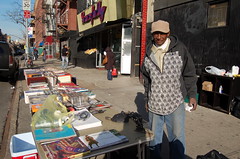“Hey, buddy, I got some tools for ya,” says Emmanuel Howard from his table full of goods on Avenue A between Second and Third Streets. While helping a neighborhood acquaintance, he was greeted continually by passersby — elderly people with dogs, leggy blondes, kids, and street folk. He says he’s been selling here for 32 years.
Mr. Howard — who is known as Manny the Peddler to almost everyone — is one of the last street peddlers on the Lower East Side, infamous in the 80’s and 90’s for blocks-long stretches of people selling everything from antique furniture to dead batteries. Former Mayor Rudy Giuliani eliminated much of the street vending during his terms, but Mr. Howard remains. At 70, he still hauls second-hand merchandise by handtruck, virtually all of it set aside for him by neighborhood residents, with one recent score of metal garbage cans and push brooms from Stomp, courtesy of the Orpheum Theater.
“There used to be people everywhere at three, four o’clock in the morning,” says Mr. Howard, who rarely stands still, between arranging his inventory and giving a quick pitch to anyone eyeing an item. “Not like now.”
“There were a lot of pros and cons to that whole history,” says Clayton Patterson, photographer and historian of the Lower East Side. Citing downsides like vendors selling brand new books in front of bookstores, and a crop of thieves’ markets, he noted that most peddlers were simply trying to survive, as well as recycling unwanted goods. “By getting rid of that culture,” he says, “there went another working class way of making money.”
A fractured family life — father and brother in jail for murder (retribution for an earlier knife attack, he says), and a mother left to raise nine kids on her own — forced independence upon Mr. Howard at a young age. He worked as a print shop delivery boy, metalworker, lathe operator, carpenter, and all around handyman, and around 1979 he began vending in front of the Con Edison substation on Sixth Street and Avenue A.
It became a bonanza. “People used to come down from upstate and buy out the whole table for six, seven hundred dollars,” he says, and then give him their business cards so he could call when he had good stock. Mr. Howard says he once made $4,500 in a week; he had never had that kind of money before.
Tony, a friend of Mr. Howard’s who began selling alongside him in 1994, recalls the wild side of the peddler scene: “That block on Second Avenue between Seventh and Eighth — that was the worst. They were thieves, axe murderers, rapists,” he says of the vendors there, whose presence tended to scare customers away from the stores on the block. Mr. Howard adds, “It used to be million dollar row, but then the drug scene moved in, and blew it; when the crack scene came in.”
With a pocketful of connections, he could sell whatever people brought to him, and the temptation got to be too much. In 1997 he says he spent nine months of a six-year term on Riker’s Island for possession of stolen goods. He suffered a heart attack while in jail, and served the rest of the term on probation.
“I messed up big time on that,” he laments, and has since returned to selling donated items from neighborhood residents, many of whom he’s done odd jobs for over the years. He says he’s lucky now if he makes a $130 in a day.
“But I’m always independent. I don’t go to welfare,” says the father of four, who also notes that he is not homeless. He suffers gout and arthritis, and the sanitation department occasionally hauls away his merchandise stored under a tarp on the sidewalk. His kids are mad at him, too, he says. “They don’t want me doin’ this anymore. But I got to stay busy, and I ain’t gonna go barging in on their lives.”
“Manny is organic to the neighborhood,” says a café owner on Avenue A who goes by the name Ali, explaining that his spot is like a public space, connecting people from different backgrounds. “I see people gathered around the tables, all different layers of society. I think it is very healthy to have that.”
Clayton Patterson says that people have to like Mr. Howard or he wouldn’t be there, noting his daily efforts to manage his enterprise responsibly. “You know, to manage that spot is a tremendous amount of work.”






